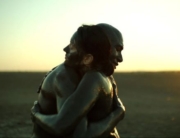The second feature film by Barry Jenkins (Medicine for Melancholy) ventures through three stages of a man’s life, played by three different actors (Alex Hibbert, Ashton Sanders, and Trevante Rhodes). As it begins, Chiron is a sensitive boy growing up in in the rough part of Miami with no father and with a mother who has a crack addiction. As a result of having practically no role models, Chiron is an extreme introvert. H is stunned into silence from his mother’s violent mood swings, his ostracism from his peers, and from being bullied for being perceived as gay, though he doesn’t quite know what gay means.
Moonlight isn’t simply a film about homosexuality. Writer/director Jenkins uses the character to examine the flaws of masculinity, here within an African American community. Fatherless, Chiron must construct his own male identity. As a child and as a teenager, he’s completely cut off from his peers, especially other males, whom he may be attracted to but whom he also views as sources of danger.
His only friend is schoolmate Kevin, who is also played by three different actors at different ages (Jaden Piner, Jharrel Jerome, and André Holland). Kevin is the kind of kid who doesn’t run with any clique, but he seems to get along with everyone. The only one of their peers who sees Chiron not as a freak, Kevin treats him just like anyone else. Chiron reacts to his sympathy by developing a crush on Kevin.
The third and final segment finds Chiron all grown up, now living in Atlanta as a drug dealer. He no longer resembles his younger self at all. With sculpted muscles, a tight T-shirt, a mean-looking grill, and a car that goes vroom-vroom, he is steeped in the gangster life. Then his old friend Kevin, who has moved on in a much different way with his life, reenters the picture. Chiron’s old feelings come bubbling back to the surface, and he begins to question how he has lived his life.
I’m purposefully trying not to give too much of the story away since Moonlight really is three short films strung together to tell one sweeping story. The most surprising thing about the film is that the third segment could stand alone as one-act play. While it is jarring at first how much the tempo slows down in the third segment, this is actually quite an effective move that reconfigures the first two segments as prologue building toward the final climax, which plays out nearly in real time.
The performances of the actors playing Chiron are quite impressive. He is such a specific, troubled character carrying a lot of psychological stress behind his eyes, and all three carry off that tension convincingly. The oldest, bulked-up iteration, played by Trevante Rhodes, is far removed from the younger Chirons, yet there are moments in his performance when the young, confused Chiron shows through his tough facade. It’s a remarkable achievement.
Among the adult actors is Mahershala Ali, an up-and-coming actor in his own right, whom most will recognize from House of Cards and as the main villain on Luke Cage. Ali plays Juan, the drug dealer who becomes Chiron’s father figure. Juan is the first man to show the boy affection and attention. There are scenes between them and Juan’s girlfriend, Theresa, played by Janelle Monáe, that are hard to get through with a dry eye because in their house Chiron, the child, is safe from his mother, his classmates, and he can be who he wants to be.
Naomi Harris (perhaps best known from the James Bond series) appears as Chiron’s single mother. Playing a crack-addict has become a thankless job for actors over the past few decades, but Harris’s Paula hits a demonic level of addiction like she’s possessed. Both director Jenkins and Harris could have a future in the exorcism genre.
In the end, Moonlight is about the pressure to act hyper-masculine (whatever that means), which consequently means tenderness and vulnerability is looked down upon. In his adulthood, Chiron chooses to become hard for survival, but at the loss of never getting to be himself. Juan’s words to young Chiron echo throughout as wisdom: “At some point you’ve got to decide for yourself who’re you gonna be, and don’t let nobody make that decision for you.”
For taking on a tough subject and its riveting performances, Moonlight stands out.







Leave A Comment